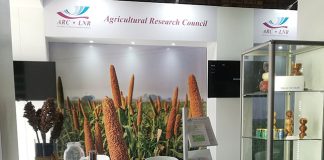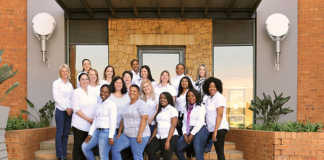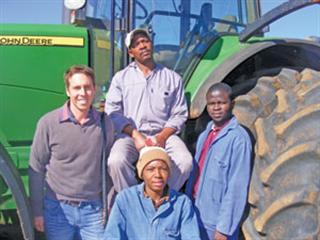
A finalist in the 2012 Free State Young Farmer of the Year competition, 34-year-old Laurens Schlebush completed a degree in Industrial and Mechanical Engineering at the University of Stellenbosch in 1999. After working in Johannesburg as an engineer, he bought the farm Geluksfontein as a going concern from his mother Benita in 2008. He says managerial and administrative experience stands him in good stead in his farming.
“These are essential skills in determining the profitability of any concern. I have learnt that it is important to have a workforce that is content and takes ownership of the roles individual members play in the business.” Benita Schlebusch farmed alone after Laurens’s father Johann died in 1995.
“I was taught a lesson in the value of a dedicated and motivated workforce at the time of my dad’s death. A few days after the funeral, the farm workers called a meeting with the family. They urged my mother to carry on farming and undertook to do the actual farming work as long as she did the administration and financial management. Their support meant the world to us, and my mom carried on farming until I could take over. She couldn’t have done it without the workers’ support and neither can I. They are an integral part of the business.”
Wheat, sunflower and maize production forms 90% of the Schlebusch farming operation’s turnover. There is also a 320-strong commercial Bonsmara herd.
Joint venture
Laurens recently ventured out into vegetable production in partnership with another young farmer, 20-year-old Deon de Groot. He says he is gaining valuable joint venture experience in the process, especially in terms of communication and financial management.
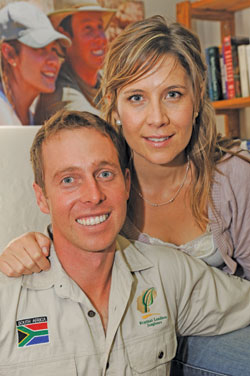
Laurens and his wife Jana are dedicated to creating a positive work environment for their staff and agree that happy employees are a deciding factor in the ultimate success of any business. Photos courtesy of Free State Agriculture
“This partnership gave me the opportunity to expand vertically and it gave Deon a chance to farm – something he is passionate about,” explains Laurens. “Our agreement meant that he had access to land and I could diversify my business. We produce pumpkins, green peppers and cabbage and market our produce in Johannesburg and Bloemfontein. Farm workers’ wives have a chance to earn extra money. They do the manual work such as cultivation, picking and sorting the vegetables.”
Empowerment
Laurens is working towards a business relationship with two members of the farm staff and says the partnership with Deon will stand him in good stead. He says that two staff members, Daniel Chabali and Moses Lekgari, are specialist supervisors in training; Daniel is in charge of the cattle and Moses of grain production. “Daniel started working on Geluksfontein in 1977 and Moses in 1991. They know the farm and the business through and through.”
Laurens feels that it makes economic sense to tap into their knowledge and to give them ownership of their part in the business. “I foresee that most commercial farms will be run in partnership with workers in the next 15 years or so,” he says. In his opinion the economic realities of commercial farming are such that economies of scale will become increasingly important.
“We will have to produce more on the same number of hectares. If commercial farmers don’t create a viable financial option so that farm workers and their children can remain in the industry, it will be very difficult to continue with commercial food production. These people will simply leave agriculture,” he continues. Laurens says any prospective partnership must be treated with caution because it will ultimately impact on profitability. That is why he is still mentoring Daniel and Moses in their respective responsibilities.
For instance, Laurens remains in charge of management issues such as the Bonsmara herd’s health and breeding programme, but Daniel is in control of the actual work and the well-being of the herd. He receives a financial bonus for each calf successfully marketed from Geluksfontein.
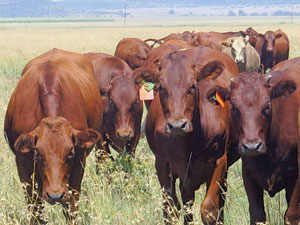
The 320-strong commercial Bonsmara herd on Geluksfontein is the responsibility of supervisor and stockman, Daniel Chabali.
“I don’t have enough time to spend with the cattle as I am so busy with grain production. The fact that Daniel is in full control of the herd means I can focus on management and planning. Daniel and I are working towards a formal partnership in future that will benefit both of us. It will probably be on a profit-sharing basis, which will create an incentive for his children and grandchildren to continue farming. Otherwise, what future is there for farm workers’ children in agriculture? If commercial farmers fail to provide work and opportunities for the younger generations, they will be compelled to leave the farm and in most cases scratch out a living in the surrounding townships.”
Moses and Laurens are also working towards a partnership. As grain specialist supervisor trainee, Moses is coached by Laurens in the finer details of the business. Although Moses works independently to a large extent, Laurens is adamant that they do not enter into an agreement prematurely.
“That would be a poor management decision. As the owner of the business I am ultimately responsible for its success or failure. That is why I must make sure that my future partners know precisely what is expected of them. These two men play a decisive role in the business and will do so increasingly in the future.”
Says Moses: “I’ve lived on Geluksfontein for a long time. I’ve worked with Laurens’s parents and have a vested interest in this business. On some farms, farm workers are poorly treated, but Laurens and his parents have always treated us as part of the team. The management route that Laurens has taken means a promising future for me and my children. I’m especially thankful for the interest he has taken in ensuring that our children get a proper education. It goes well with us on Geluksfontein.”
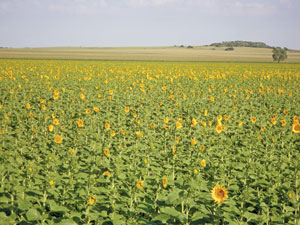
Wheat, sunflower and maize production makes up 90% of the Schlebusch farming operations’ turnover. The rest is taken up by vegetable and beef production.
Moses’ son Lebogang Lekgari (16) and godchild Itumeleng Motapane (20) attend the Petrusburg secondary school, about 100 km from Geluksfontein. They completed primary school at a nearby farm school, but Laurens and the boys’ parents faced many problems trying to get them into a high school in nearby Bloemfontein where hostels in the townships are very limited. Facilities in the city are expensive and children would have to be accommodated as boarders in a township.
Laurens and their parents therefore decided on Petrusburg where pupils are accommodated in the school hostel. “The secondary schooling of farm workers’ children must be urgently addressed by government. It is deplorable to expect these children to leave their homes on the farm and fend for themselves in a township or squatter camp so that they can go to school. After long and unsuccessful negotiations with the education department we decided to send the children to Petrusburg, where good care will be taken of them.”
Abednego Mnyamane, who has been working on the farm since he was 21 years old, agrees that opportunities must be created for young people to return to farms. “Our children were born and bred on Geluksfontein. If Laurens had not helped us send them to school, goodness knows what would have happened to them.”
Laurens believes that he is blessed to have obtained a good education and to have been able to continue in his father’s footsteps. He says it is his God-given obligation to make sure that his employees’ sons and daughters have the same opportunities.
“Clearly, I can’t employ all of them nor can I buy them farms, but I do all I can to ensure that they receive a good education, and involve some of them in the farming business. Lebogang wants to study agriculture while Itumeleng is set on becoming a traffic officer. “It is my responsibility to help them reach their goals in any way I can.”
Contact Laurens Schlebusch on 082 800 4031.











